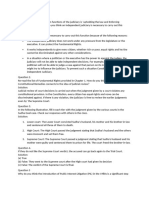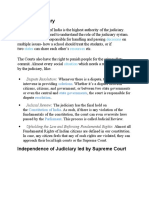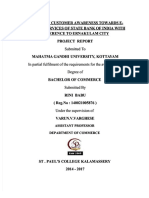Judiciary Class 8 Notes CBSE Political Science Chapter 5 PDF
Judiciary Class 8 Notes CBSE Political Science Chapter 5 PDF
Uploaded by
bhuvannayak07Copyright:
Available Formats
Judiciary Class 8 Notes CBSE Political Science Chapter 5 PDF
Judiciary Class 8 Notes CBSE Political Science Chapter 5 PDF
Uploaded by
bhuvannayak07Original Title
Copyright
Available Formats
Share this document
Did you find this document useful?
Is this content inappropriate?
Copyright:
Available Formats
Judiciary Class 8 Notes CBSE Political Science Chapter 5 PDF
Judiciary Class 8 Notes CBSE Political Science Chapter 5 PDF
Uploaded by
bhuvannayak07Copyright:
Available Formats
Revision Notes Class 8
Social Science - Civics
Chapter 5 - Judiciary
Judiciary
The judiciary is the system of courts that decides on legal disputes and legal cases.
Importance of Judiciary
● Judiciary is the guardian of the constitution.
● The judiciary plays an important role in the interpretation of laws.
● It keeps a check on the powers of the legislature and the executive.
Role of Judiciary
● Resolution of dispute
● Judicial review
● Validating the law and applying fundamental rights
What Is an Independent Judiciary?
The courts are not under the government. The independent functioning ensures
that no power is misused by the executive or the legislature. The judges to the
Supreme Court and High Court are appointed by the President of India after
consultation with the Governor of the concerned state and the Chief Justice of the
Supreme Court.
Structure of Courts in India
● District court
● High court
● Supreme court
The decision that is made in a higher court is bound to the lower courts.
Who has Access to Courts?
● All the citizens of India have access to the courts.
● Every citizen has the right to demand justice from the courts of India.
● In the early 1980s, the Supreme Court started the mechanism of public
interest litigation (PIL).
Frequently Asked Questions & Answers
1. Write down some examples of the following disputes:
Class VIII Social Science www.vedantu.com 1
(A) A dispute between the centre and the state
Ans: Disputes over voting share in the GST Council
(B) A dispute between two States
Ans: Kaveri River dispute between Karnataka and TamilNadu
(C) A dispute between two citizens
Ans: Property disputes in the country
(D) A dispute between two countries
Ans: Dispute over Aksai Chin between India and People’s Republic of China
2. What is the meaning of law and judiciary?
Ans: Law is the set of rules imposed by the government which is applied to
govern the citizens of India. It helps to shape society's politics and economics in
many ways.
The Judiciary is the system of courts that explains, defends, and applies the law
in legal cases. The judiciary’s work is divided into three categories:
● The resolution of the dispute
● Judicial review
● Validating the law and applying fundamental rights
3. What is a PIL?
Ans: PIL stands for Public Interest Litigation which is filed in a court for the
protection of public interest such as pollution, safety, etc. PIL can be filed:
● Against the government policies
● For the violation of human rights and fundamental rights
● For a complaint against civic authorities for not performing their duties
4. Explain the terms Acquit and Appeal
Ans: The term acquits means that the court has declared a person not guilty of
the charges which they have been tried for in front of the court. To appeal means
to file a petition before a higher court to listen to a case that has already been
judged by a lower court.
5. What are the six major fundamental rights in the constitution of India?
Ans: The six major fundamental rights given in the Constitution of India are:
● Right to equality
● Right to freedom
● Right against exploitation
Class VIII Social Science www.vedantu.com 2
● Right to freedom of accepting any religion
● Cultural and educational rights
● Right to constitutional remedies
Class VIII Social Science www.vedantu.com 3
You might also like
- Arts Humanities2323980Document2 pagesArts Humanities2323980pdhamgaye2288No ratings yet
- RK Questions & Answers 29012023Document41 pagesRK Questions & Answers 29012023priyanka.elixirlegalNo ratings yet
- Callan Method Training Course Manual - 2017Document77 pagesCallan Method Training Course Manual - 2017Casamento Yuri e Carol80% (5)
- CBSE Political Science Chapter 4 Judiciary Class 8 Notes FREE PDFDocument4 pagesCBSE Political Science Chapter 4 Judiciary Class 8 Notes FREE PDFrahulghosh9625417538No ratings yet
- The JudiciaryDocument5 pagesThe JudiciarykanhaiyagiwardiaNo ratings yet
- Class 8 JudiciaryDocument3 pagesClass 8 JudiciaryPriyaranjan PandeyNo ratings yet
- JudiciaryDocument3 pagesJudiciaryakshaj.chittiproluNo ratings yet
- STD VIII NOTES CIVICS CH.5 - JudiciaryDocument3 pagesSTD VIII NOTES CIVICS CH.5 - JudiciaryAnshul DessaiNo ratings yet
- Notebook Work - Chapter 5 - JUDICIARY-2023-24 3Document3 pagesNotebook Work - Chapter 5 - JUDICIARY-2023-24 3dodo nanaNo ratings yet
- Judiciary 17Document7 pagesJudiciary 17Jatin SoniNo ratings yet
- 8th - Civics - 5th lesson JudiciaryDocument11 pages8th - Civics - 5th lesson Judiciarypothank14No ratings yet
- JudiciaryDocument9 pagesJudiciarydhvanivalandNo ratings yet
- Civics Chapter 5 JudiciaryDocument1 pageCivics Chapter 5 Judiciaryanoushka.16082007No ratings yet
- Judiciary Notes 2Document3 pagesJudiciary Notes 2harsiratk123No ratings yet
- Judiciary HandoutDocument3 pagesJudiciary Handoutsweetyappu88No ratings yet
- Ryan International School Chandigarh Class: 8 Subject: Social Science Chapter: L-23 Judiciary (Civics)Document3 pagesRyan International School Chandigarh Class: 8 Subject: Social Science Chapter: L-23 Judiciary (Civics)Tanmay Nath JhaNo ratings yet
- Ryan International School Chandigarh Class: 8 Subject: Social Science Chapter: L-23 Judiciary (Civics)Document3 pagesRyan International School Chandigarh Class: 8 Subject: Social Science Chapter: L-23 Judiciary (Civics)Tanmay Nath JhaNo ratings yet
- Public Interest Lawyering NOTESDocument90 pagesPublic Interest Lawyering NOTESmadhav maheshwariNo ratings yet
- The Roleof Judiciaryin IndiaDocument6 pagesThe Roleof Judiciaryin IndiaSheela AravindNo ratings yet
- CIVICS Ls 5 Judiciary NotesDocument17 pagesCIVICS Ls 5 Judiciary NotesKrithikStudyDa DaNo ratings yet
- Class 8, Notes, The Indian ConstitutionDocument3 pagesClass 8, Notes, The Indian ConstitutionRAMAKRISHNANo ratings yet
- IB AssignmentDocument10 pagesIB AssignmentffsffsNo ratings yet
- Notes - Working of InstitutionsDocument5 pagesNotes - Working of Institutionsaaryan singhNo ratings yet
- 1. Judicial Process Important Question and AnswerDocument52 pages1. Judicial Process Important Question and Answerbhanushal.rajNo ratings yet
- CHAPTER 5 Political ScienceDocument3 pagesCHAPTER 5 Political Scienceanshika1792010No ratings yet
- Rights 11th ClassDocument7 pagesRights 11th Classranudevi1079No ratings yet
- Contemporary India and EducationDocument21 pagesContemporary India and EducationAchu AniNo ratings yet
- Important Questions For CBSE Class 8 Social Science - Social and Political Life Chapter 5 - JudiciaryDocument7 pagesImportant Questions For CBSE Class 8 Social Science - Social and Political Life Chapter 5 - Judiciaryadityakumar2019.akNo ratings yet
- Indian JudiciaryDocument24 pagesIndian JudiciaryBilal SiddiquiNo ratings yet
- Role of Judiciary: Decisions States ResourcesDocument5 pagesRole of Judiciary: Decisions States Resourcestayyaba redaNo ratings yet
- Legal Research and Moot CourtDocument8 pagesLegal Research and Moot Courtjaatsahil9904No ratings yet
- Public Interest Lawyering NOTESDocument90 pagesPublic Interest Lawyering NOTESRo-hit ShirsatNo ratings yet
- Working of Institution Class 9 NotesDocument5 pagesWorking of Institution Class 9 NotesMridula ThakurNo ratings yet
- CH.1 Constitution and The Need For LawsDocument3 pagesCH.1 Constitution and The Need For LawsmahasivanNo ratings yet
- Ak SR Civics L-1 CL-8 PDFDocument3 pagesAk SR Civics L-1 CL-8 PDFabhijeetdwivedi133No ratings yet
- Judicial ActivismDocument3 pagesJudicial ActivismPrerna KumariNo ratings yet
- Class-B.A.Ll.B Viiith Semester Subject - Administrative Law Paper Code - 801Document6 pagesClass-B.A.Ll.B Viiith Semester Subject - Administrative Law Paper Code - 801Ayush GuptaNo ratings yet
- Class 8 Civics Judiciary Class Work NotesDocument2 pagesClass 8 Civics Judiciary Class Work NotesChristopher SamuelNo ratings yet
- What Is Public Interest Litigation (PIL) ?: IAS ExamDocument15 pagesWhat Is Public Interest Litigation (PIL) ?: IAS Examvishakha NaikNo ratings yet
- Class 8 Judiciary Assignment Sheet AnswersDocument3 pagesClass 8 Judiciary Assignment Sheet AnswersIndia Tech with Astitva67% (3)
- Democractic RightsDocument4 pagesDemocractic RightsTinkercad SifatNo ratings yet
- Social Science & Engineering Economics SanjivaniDocument36 pagesSocial Science & Engineering Economics SanjivanigauravNo ratings yet
- Hiearchy of CourtsDocument20 pagesHiearchy of CourtsjagadeshNo ratings yet
- Pil Project WorkDocument32 pagesPil Project WorkShailesh PandeyNo ratings yet
- CBSE Class 8 Political Science (Civics) Chapter 4 Notes - Understanding LawsDocument5 pagesCBSE Class 8 Political Science (Civics) Chapter 4 Notes - Understanding LawsAnand RajNo ratings yet
- Panjab University, Chandigarh University Institute of Legal StudiesDocument20 pagesPanjab University, Chandigarh University Institute of Legal Studiesharshul1261No ratings yet
- Different Aspects of Public Interest Litigation in IndiaDocument30 pagesDifferent Aspects of Public Interest Litigation in IndiaAnkit JindalNo ratings yet
- Social - VIII-spl - ch-5 The JudiciaryDocument3 pagesSocial - VIII-spl - ch-5 The JudiciarySajeedha Begum Abdul LatheefNo ratings yet
- Class 8, Social Science (Social and Political Life-III) NOTES, Ln.1-The Indian ConstitutionDocument5 pagesClass 8, Social Science (Social and Political Life-III) NOTES, Ln.1-The Indian ConstitutionEmiya susan JobyNo ratings yet
- Advocate General of States in Indian PolityDocument7 pagesAdvocate General of States in Indian PolityALPINE GROUP OF INSITUTES DEHRADUNNo ratings yet
- Public Interest LitigationDocument18 pagesPublic Interest LitigationNeerajSinhaNo ratings yet
- Constitutional Law - Semester IDocument22 pagesConstitutional Law - Semester IGokul KrishnaNo ratings yet
- PILDocument7 pagesPILTanishk jandialNo ratings yet
- Introduction To Indian JudiciaryDocument9 pagesIntroduction To Indian Judiciarysoumita2508No ratings yet
- "Chapter 2: Rights in The Indian Constitution ": F R I CDocument4 pages"Chapter 2: Rights in The Indian Constitution ": F R I Craj pandeyNo ratings yet
- THE JUDICIARY-Notes-1Document1 pageTHE JUDICIARY-Notes-1abdulsufiyan2011No ratings yet
- LLJP Notes 3Document28 pagesLLJP Notes 39vx9d4qnxcNo ratings yet
- Judicial ActivismDocument3 pagesJudicial ActivismranjitharunNo ratings yet
- Judiciary NotesDocument7 pagesJudiciary NotesPratibha SinghNo ratings yet
- Restatement of Values of Judicial LifeDocument29 pagesRestatement of Values of Judicial Lifejuber hussainNo ratings yet
- Nayay PanchayatDocument8 pagesNayay PanchayatManisha MagguNo ratings yet
- EQAO Prep On MathspaceDocument3 pagesEQAO Prep On MathspacejasonaustinachuNo ratings yet
- DP7.00 - Support - Matrix - Device - Support v1.0Document62 pagesDP7.00 - Support - Matrix - Device - Support v1.0Jordi JordiNo ratings yet
- NCM 117 Rle - Psychodynamic TherapyDocument4 pagesNCM 117 Rle - Psychodynamic TherapyKate Angelique Rodriguez100% (1)
- FRACTURE User GuideDocument10 pagesFRACTURE User GuideCara KekNo ratings yet
- Artificial Intelligence - Branches of ArtificialDocument8 pagesArtificial Intelligence - Branches of ArtificialSiddiq khanNo ratings yet
- Laboratory Test of Vibration of Micro/Nano Satellite For y / Environment Test StandardizationDocument33 pagesLaboratory Test of Vibration of Micro/Nano Satellite For y / Environment Test Standardizationsweswemar83No ratings yet
- FullWork-GilbertNyavieFINALEDITING Aug2014 PDFDocument122 pagesFullWork-GilbertNyavieFINALEDITING Aug2014 PDFAwadhut MaliNo ratings yet
- PDF e Banking Project On Sbi CompressDocument26 pagesPDF e Banking Project On Sbi CompressPawanNo ratings yet
- Week 1 AnalogyDocument27 pagesWeek 1 AnalogyShamiah HernandezNo ratings yet
- InvoiceDocument2 pagesInvoicerahul.kishore8No ratings yet
- Btech Ve 3 Sem Universal Human Values and Ethics Kve301 2022Document1 pageBtech Ve 3 Sem Universal Human Values and Ethics Kve301 2022Digvijoy RanjanNo ratings yet
- Pulse Width Modulated Control of PVEA/M/H/S: T T Cycle DutyDocument5 pagesPulse Width Modulated Control of PVEA/M/H/S: T T Cycle DutyerosNo ratings yet
- Report On Power StationDocument83 pagesReport On Power StationIliashAhammedNo ratings yet
- Statement 0305202205080370Document4 pagesStatement 0305202205080370Arjun KumarNo ratings yet
- Caesar S Conquest of Gaul T Rice Holmes PDFDocument944 pagesCaesar S Conquest of Gaul T Rice Holmes PDFJoão Bértolo100% (3)
- Action Plan Template: Action Responsible Priority StatusDocument3 pagesAction Plan Template: Action Responsible Priority StatusSenapati Prabhupada DasNo ratings yet
- Dangers of MeditationDocument6 pagesDangers of MeditationsainandanreddyNo ratings yet
- Lampkins Digital Citizen ProjectDocument27 pagesLampkins Digital Citizen Projectapi-242604347No ratings yet
- Unzip LogsDocument95 pagesUnzip LogsEdwin RambeNo ratings yet
- Jio 9Document1 pageJio 9dwall29292No ratings yet
- Bamboo ConstructionDocument68 pagesBamboo ConstructionYogesh SoodNo ratings yet
- 9 Algebra PDFDocument331 pages9 Algebra PDFaslan50% (4)
- DNR LHS NitDocument15 pagesDNR LHS Nititspiku.dhnNo ratings yet
- GUIDELINES START UP Ms TramDocument9 pagesGUIDELINES START UP Ms Tramlocntse150877No ratings yet
- Reset BaterieDocument4 pagesReset BaterieFlorin IonescuNo ratings yet
- Mod MasterDocument4 pagesMod MasterNitin ChavanNo ratings yet
- Mechanics of Fluid 1: Nor Faiza Abd Rahman Faizaabdrahman@segi. Edu - MyDocument45 pagesMechanics of Fluid 1: Nor Faiza Abd Rahman Faizaabdrahman@segi. Edu - MyMrunmayee ManjariNo ratings yet
- Utiles Especificos BMW R1200GsDocument12 pagesUtiles Especificos BMW R1200GsFrancisco Javier Flores PinoNo ratings yet

























































































